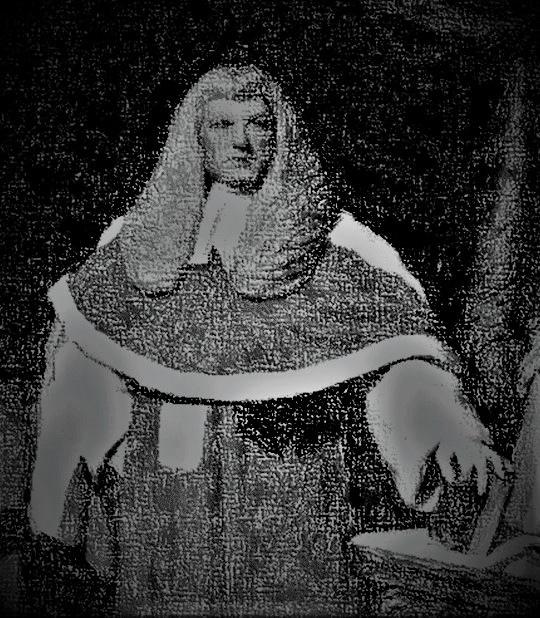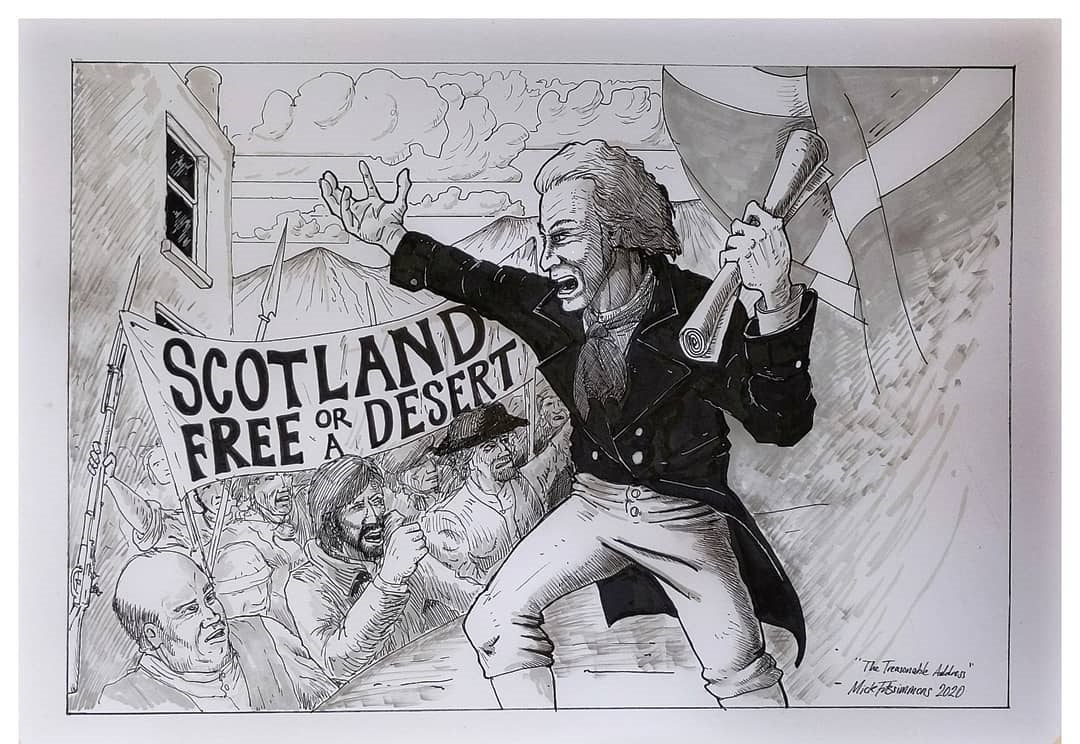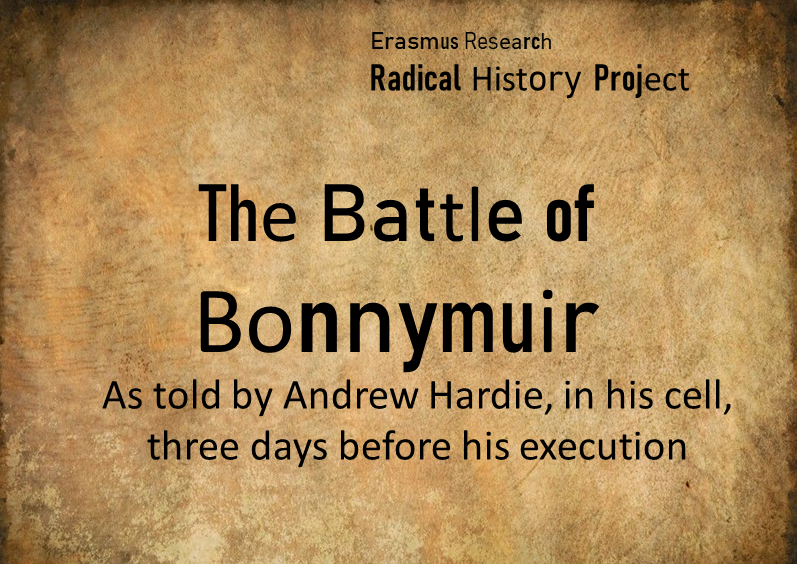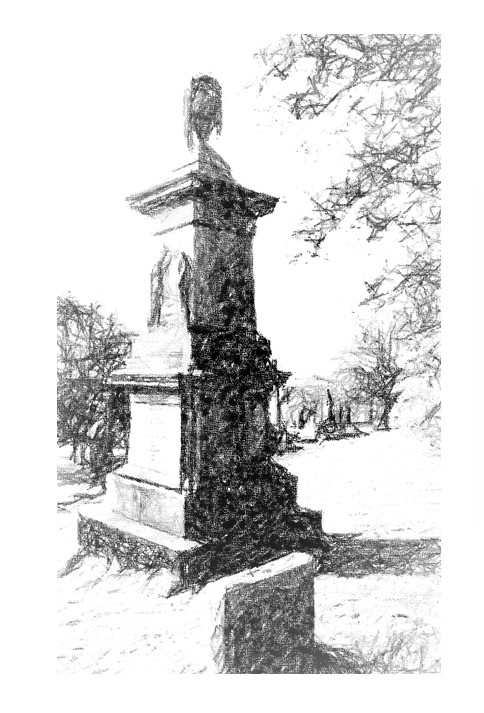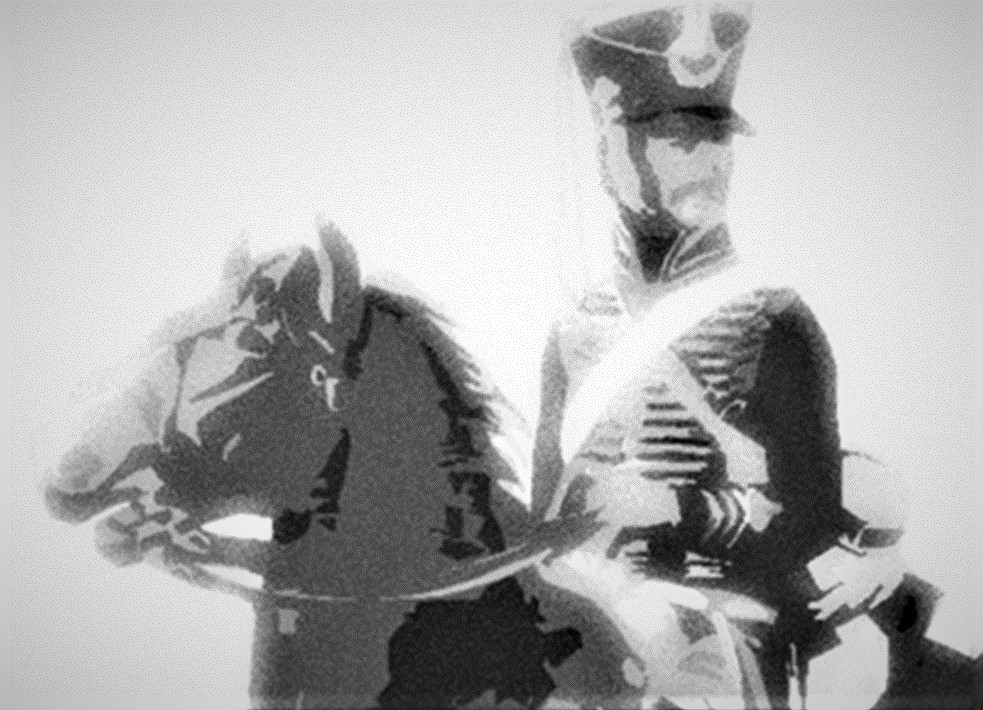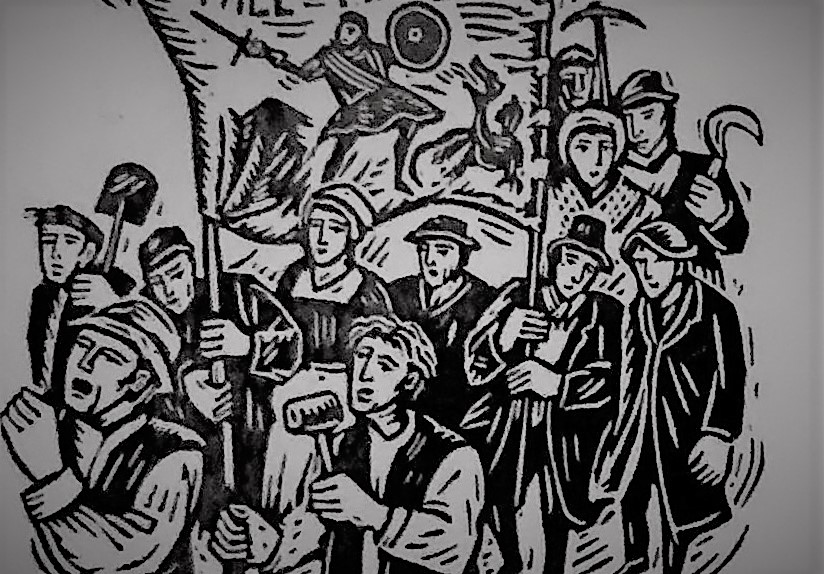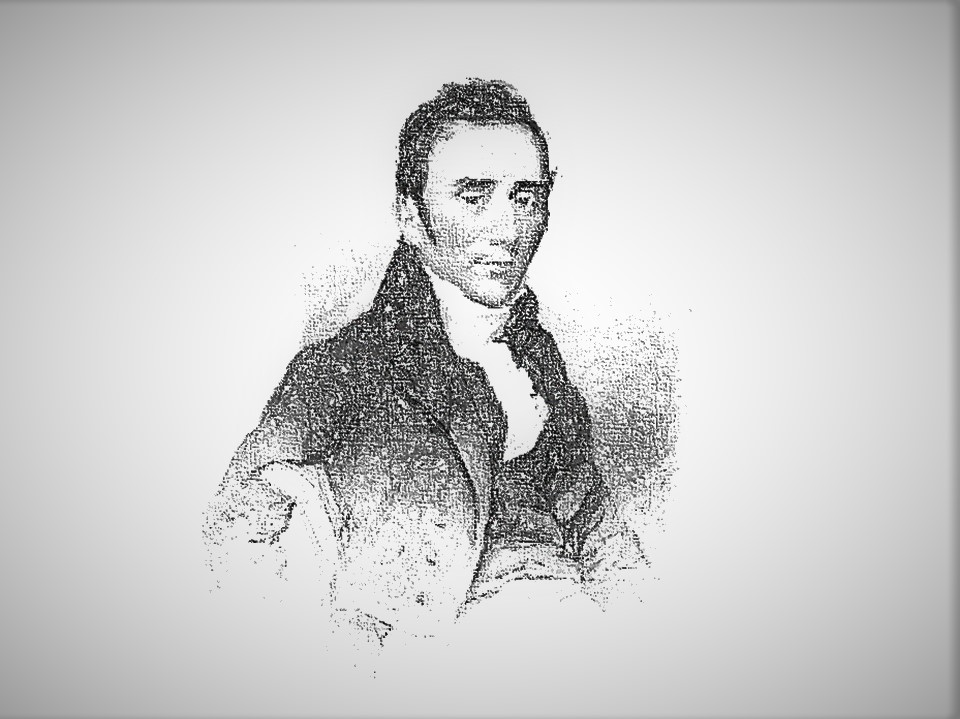
This is the second section of Chapter X of the serialisation, the wording reproduced exactly as it appeared in the Stirling Sentinel, on Tuesday 16th April 1889.
Sheriff-Substitute Dow, Mr R. Sconce, writer, Stirling, Sheriff Duff, Edinburgh, and Mr John Watkins, Sheriff Clerk, Edinburgh, all spoke to the various declarations emitted by the prisoner Hardie. In these declarations Hardie said he brought a firelock with him from Glasgow, which he had for several years, and when coming down the hill to meet the cavalry some other man got his firelock and he got a pike. He got three ball cartridges at Gadsbridge from a man he did not know. He was a tall man, dressed in dark-coloured surtout; who, when he gave the declarant the cartridges, wished him success and said he would join them soon, but the declarant never saw the man afterwards. [He was said to be one of the Government spies.] At Gadshill declarant met a man [this was King the spy] who said he had got instructions how to act and where to go. He said the country was in arms. This was a little man, rather stout made, and appeared to be about forty years of age; he was dressed in a brown short coat and dark trousers.
He went on before them to the different villages on the road, as far as Camelon, but the declarant never saw him again. He appeared to be like a tradesman, and was but indifferently dressed, and seemed a very active man. The whole party were unanimous as to taking arms wherever they could find them; and they searched a few houses for arms, but they only got one musket in the course of their search. The musket was hanging from the roof of the kitchen about five feet from the fire. There was an old man in the house who asked when he would get the musket again, when declarant said he would give a receipt for it, but no receipt was required. The three ball cartridges got at Gadsbridge were given by the declarant to the cavalry when he was taken prisoner. The purpose in going out was to effect a change in public affairs. The declarant did not mean the subversion of the Government, but what he wanted was the restoration of the people’s rights – annual Parliaments and election by ballot. He conceived the people had a right to obtain what the majority of the nation applied for, and his idea was that it was the duty of a proper Government to grant whatever was thus applied for.
The reading of the Treasonable Address, after a good deal of argument as to its admission, closed the case for the prosecution.
Mr Jeffrey then proceeded to address the jury on behalf of the prisoner at the bar. I rise now, he said, God knows with anxiety enough, to discharge what, however, I have always looked forward to as the least anxious part of my task. For, from the moment when a sense of duty to my profession, and to the unfortunate persons whose situation has given them a claim upon that profession; and when a sense of obedience to the suggestions of those persons on the Bench, to whom as a professional, and as an individual person, I own the highest respect – I say, gentlemen, from the first moment that these considerations reluctantly, and with great hesitation, prevailed with me to venture on the painful and responsible task for which all who know the situation in which I have been placed, are aware I had so little time to prepare, I had considered that task as attended, not certainly with more pain than I have experienced, but as likely to involve me in greater difficulties and perplexities than I have yet had to encounter.

But from the beginning I was comforted and upheld by the reflection, that at the most important stage of the proceedings, I should at last escape from the labyrinth of a law with which, though a part of the law of our own land, I may, without shame, say my acquaintance was very trifling; for almost a whole century has elapsed without any person having an opportunity, practically, to learn its application in this part of the island. I did trust, therefore, that however much I might be baffled and perplexed, and perhaps in some degree exposed, in struggling with a system of jurisprudence so foreign to my studies, one period of the trial would restore me to self-possession, and give my client some change of benefit from the assistance a person in my profession could render him.
At that period, we have at last arrived, when escaping from all the perplexities of the law, I have to deal only with the plain unsophisticated sense, sound reason, and consciences of a jury of my countrymen, and with the plain evidence of facts upon which I humbly conceive there can be little ground for dispute. Gentlemen, you will understand that I am not here to justify the conduct of the prisoner at the bar. I am not here to say that a great deal has not been proved against him, which infers blame of a very weighty aggravated description – I am not even here to pretend that crimes of a heinous nature have not been sufficiently established against him.
The question of his guilt or innocence, generally, is not the question that you are now to try. It is by no means necessary for that verdict, which I trust you will ultimately find yourselves at liberty to return, that you should think well of his conduct, or even that you should think it is not deserving of the highest reputation and censure. The question you have to try, gentlemen, is a far narrower and precise question; and is merely, whether there has been sufficient legal, convincing and clear evidence to force you upon your oaths in spite of the presumption for innocence that is established in every system of law- in spite of the pleadings of mercy which it is no less your duty to listen to than do justice – I say, gentlemen, the question is whether you have evidence sufficient, in spite of these considerations, to compel you to say that there is no doubt that the prisoner has committed the specific and aggravated offence of high treason.
After a luminous exposition of the law of treason, Mr Jeffrey referred to the Treasonable Address. If that handbill, he said, had been brought home to the prisoner at the bar – if any evidence had been laid before you that he had been a party, or a member of a committee for organising a provincial government – if any expression or speech had fallen from him, deliberately uttered, advisedly and repeatedly uttered – for I think it would require that – approving the tenor of that publication with evidence that he understood the tenor of it when he did so approve of it – why, gentlemen, I must confess that I should tremble for his fate; and in spite of my reliance on the mercy with which your justice would be tempered, I should scarcely dare to lift my eyes to ask what your justice might have been called upon to pronounce. But, gentlemen, is that the case here? Is there any evidence, in the first place, such as I confess I expected, and I think I was prepared to rebut – is there any evidence that this individual had for any course of preceding time been engaged as an active reformer, or a meddler in politics at all? Has it been proved that he was the hearer or maker of speeches at any Radical meeting, or a zealot for annual parliaments and suffrage by ballot, or any other reform? Has the prosecutor thought fit to go back so far as to satisfy you that upon whatever motives he acted during these four days, these motives were even deliberately considered, or formed any part of his settled opinions, or the whole of his habitual conduct?
Does he select his first victim on account of the aggravated and peculiar and prominent features of his offence, and yet is he unable to show that he longed to that class of persons with whom, undoubtedly, the greatest and most unexpiable guilt must rest, by whose machinations, by whose stimulating poisons, the mass of the ignorant population has been infected? Here there is no foundation laid for the belief of a treasonable purpose; for that, like all other fixed purposes for which persons are to be responsible with their lives, ought to be shown, not to be abandoned after a few days, but that the mischief was ripe in the country for years before; but there is no attempt to trace this man back one step beyond the brief period during which his conduct has been put in evidence before you today.
(To be continued.)

